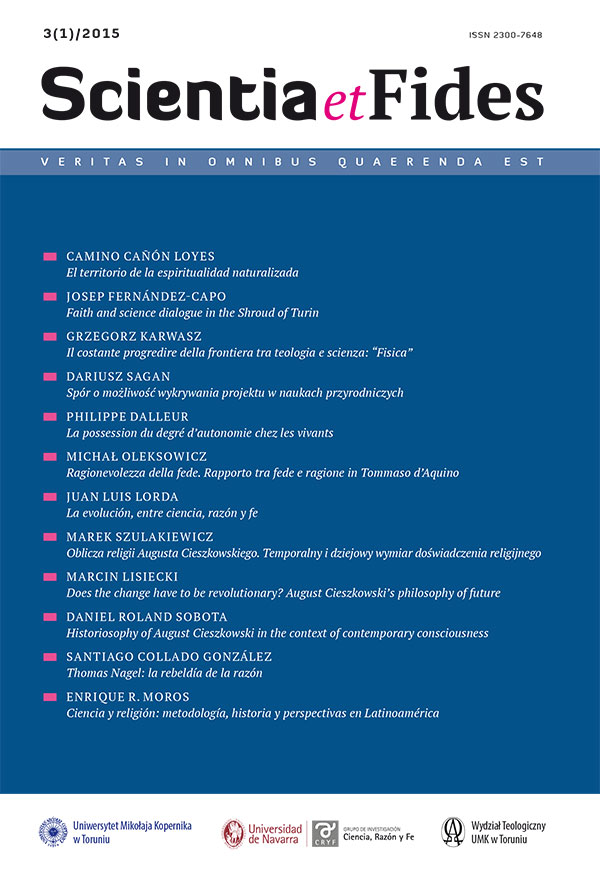Il costante progredire della frontiera tra teologia e scienza: “Fisica”
DOI:
https://doi.org/10.12775/SetF.2015.008Schlagworte
Creation, Big Bang, Homo SapiensAbstract
On constant movement of frontiers between Theology and Science: Physics
Pope Benedict XVI wrote in 1979 in “Four sermons on the Creation of world” that scientific discoveries cause a kind of retreat of the faith on “defensive” positions, giving an impression that in few centuries there would be no single dogma of faith valid. Discussing progresses of physics in last century (inflation of Universe, non-locality of quantum mechanics), of linguistics (the origin of Indo-European languages) and of genetics (mitochondrial DNA of Homo sapiens) we show that scientific discoveries make the faith retreat only apparently. In fact, the progress of science does not change the principles of Faith, but only illustrates and validates them: remain valid thesis of St. Thomas and St. Augustine. Every science discovery creates new questions, making clear that man has to depend both on reason and Faith. The aim of the article is not to “explain” the Bible according the newest discoveries but to show that these discoveries do not corrode the principles of Faith. In this way the border between natural sciences and theology remains in a constant movement: theology leaves to science obvious facts, entering deeper to the mystery of Revelation.
Literaturhinweise
Agnoli, F. 2001. La filosofia della luce: dal Big Bang alle cattedrali. Tavagnacco: Edizioni Segno.
Aristotele. 2000. Metafisica. Libro E, 1. Milano: Bompiani.
Agnoli, F, 1980. De coeli. Libro II, XII. Warszawa: PWN.
Agostino. De Genesis ad Litteram. Libro I, cap. 19.39.
Barrow, J. D. , Tipler F. J. 2002. Il principio antropico. Milano: Adelphi Milano.
Beringer, J. 2012. et al. (Particle Data Group) Review of Particle Physics. Phys. Rev.D 86 010001.
Collado González, S. 2013. “Le religión en la ciencia contemporánea. Impertinencias e inspiración.” Scientia et Fides 1: 68.
Giovanni della Croce. 2006. Salita del Monte Carmelo, Libro II, Cap. 10, pt. 2. Roma: Editore, Roma.
Giovanni Paolo II. 1998. Lettera enciclica Fides et Ratio del Sommo Pontefice Giovanni Paolo II ai vescovi della Chiesa Cattolica circa i rapporti tra fede e ragione.
Giovanni Paolo II. 1992. Discorso alla Pontificia Accademia delle Scienze in occasione della presentazione dei risultati della commissione di studi sul caso Galileo.
Goebel, T. 2007. “The Missing Years of Modern Humans.” Science 315: 194.
Hyers, C. 1984. The Meaning of Creation. Genesis and Modern Science. Atlante: John Knox Press.
Karwasz, G. et al. 2000. “Semplici esperimenti con sorgenti di luce (in polacco).”Fizyka w Szkole 5: 239.
Karwasz, G. 2011. “Fine della scienza? Per il momento niente paura (in polacco).” Edukacja Filozoficzna 52: 5.
Karwasz, G. 2012. Teaching science in early childhood – inquiry-based, interactive path on energy.Proceedings GIREP-EPEC Conference, University of Jyväskylä: 68.
Lambert, D. 2006. Scienze e teologia. Figure di un dialogo. Roma: Città Nuova.
Leibniz, G. W. 2008. Essais de théodicée. Sur la bonté de Dieu, la liberté de l’homme et l’origine du mal. Paris: Flammarion.
Macaulay, V. 2005. “Single, Rapid, Coastal Settlment of Asia Revealed by Analysis of Complete Mitochondrial Genomes.” Science 308: 1034.
Maslin M. A, S. Shultz S., Trauth, M. H. 2015. “A synthesis of the theories and concepts of early human evolution.” Phil. Trans. R. Soc. B 370: 20140064.
Messori, V. 1985. Rapporto sulla Fede. Colloquio con il cardinale Joseph Ratzinger. Torino: Edizioni San Paolo.
Ofer, B.Y. 1998. “The chronology of the Middle Paleolithic of the Levant.” In T. Akazawa, K. Aoki, and O. Bar-Yosef, eds. Neandertals and modern humans in Western Asia. New York: Plenum.
Pagel, M. et al. 2013. “Ultraconserved words point to deep language ancestry cross Eurasia,” Proc. Nat. Acad. Sciences of USA 110: 8471.
Pascal, B. 2008. Dio o il mondo. Milano: Mondadori Editore.
Perszon, J. 2013. “Teologia wśród nauk (Teologia tra le scienze).” Scientia et Fides 1: 151.
Poznik G. D.. et al. 2013. “Sequencing Y Chromosomes Resolves Discrepancy in Time to Common Ancestor of Males Versus Females.” Science 341: 562.
Ratzinger, J. 2006. In principio Dio creò il cielo e la terra. Riflessioni sulla creazione e il peccato, Torino: Lindau.
Samek Lodovici, G., 2004. L’esistenza di Dio, collana “I Quaderni del Timone”. Novara: Edizioni Art.
Schroeder, G. L. 1991, Genesi e Big Bang. Uno straordinario parallelo fra cosmologia moderna e Bibbia. Cuneo: Interno Giallo Editore.
Szamot, M. 2003. Genesis, qualcuno crede ancora? (in polacco). Kraków: Edizioni WAM, Kraków.
Tommaso d’Aquino. 1997. Commenti a Boezio, Questione V, Articolo I, Milano: Rusconi Editore.
Udías, A. 2010. Ciencia y religión. Dos Visiones del mundo. Santander: Sal Terrae.
Weinberg, S. 1994. I primi tre minuti. L’affascinante storia dell’origine dell’universo. Milano: Mondadori-De Agostini.
Zichichi, A. 1999. Perché io credo in Colui che ha fatto il mondo. Tra fede e scienza. Milano: Il Saggiatore.
Downloads
Veröffentlicht
Zitationsvorschlag
Ausgabe
Rubrik
Lizenz
Copyright (c) 2015 Scientia et Fides

Dieses Werk steht unter der Lizenz Creative Commons Namensnennung - Keine Bearbeitungen 4.0 International.
CC BY ND 4.0. The Creator/Contributor is the Licensor, who grants the Licensee a non-exclusive license to use the Work on the fields indicated in the License Agreement.
- The Licensor grants the Licensee a non-exclusive license to use the Work/related rights item specified in § 1 within the following fields: a) recording of Work/related rights item; b) reproduction (multiplication) of Work/related rights item in print and digital technology (e-book, audiobook); c) placing the copies of the multiplied Work/related rights item on the market; d) entering the Work/related rights item to computer memory; e) distribution of the work in electronic version in the open access form on the basis of Creative Commons license (CC BY-ND 3.0) via the digital platform of the Nicolaus Copernicus University Press and file repository of the Nicolaus Copernicus University.
- Usage of the recorded Work by the Licensee within the above fields is not restricted by time, numbers or territory.
- The Licensor grants the license for the Work/related rights item to the Licensee free of charge and for an unspecified period of time.
FULL TEXT License Agreement
Stats
Number of views and downloads: 642
Number of citations: 1



